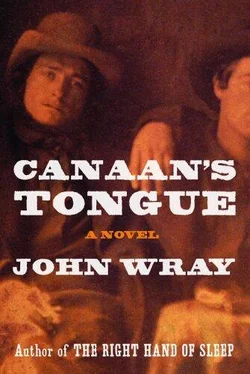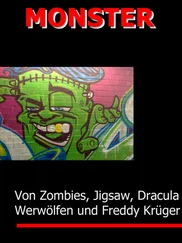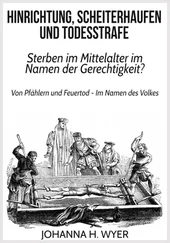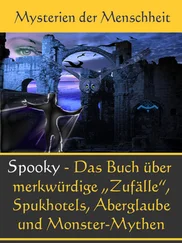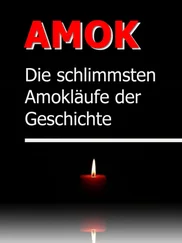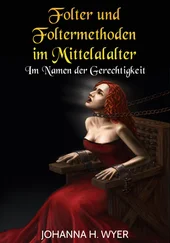“Your colleague seems in a frightful hurry to absent himself, Mr. Harvey,” Stacey said, squinting at me sharply through the smoke. “One might almost suspect that he was prejudiced against us.”
“I feel nothing but affection for your fine city, Mr. Stacey,” I said sourly. “But there’s a touch of yellow fever going round. Have you perhaps not noticed?”
Stacey regarded me blankly for a moment. “Yellow fever?” he said.
Had I felt one crumb less indifferent to the world, less bone-tired and defeated, I might have wondered at this reply—; by that point, however, I had less curiosity in me than a teak-wood Indian.
“Does this sucker have a name?” I said, already three-quarters out the door.
“Morrith Barker!” Harvey chirped.
THE PENDLETON STRADDLED THE BOUNDARY between the east and west halves of the city — between the stricken and the hale — and as such should have found itself balanced precariously between its customary function as a glorified brothel and the more novel one of a charnel-house—; whatever force it was that kept the Yellowjack at bay, however, had been magnanimous to the old hotel. Aside from the inexplicable presence of seven tame white ducks, I saw nothing out of the ordinary as I stepped into its tastefully gas-lit lobby—: only trades-people sipping grandiose-looking drinks, and grandioser whores beside them, tittering and dipping their cigar-ends into brandy.
I found Barker crammed between two buffalo-hipped octaroons who outweighed him by at least a hundred pounds apiece.
“Evening, Your Honor,” I said to him, doffing an imaginary cap. “You like your chicken frying-size, I see.”
“Guilty as charged, Virgil—; guilty as charged,” Barker said quickly, freeing himself with no small amount of effort. “I was hoping you might find the time to call.”
“Wanting to purchase some niggers, were you?” I said in my most professional tone of voice. The two octaroons glared at me, unmoved. I could only guess how much they’d soaked him for already.
“Not precisely, Mr. Ball—; no,” Barker said, taking me by the arm. “Would you be so kind as to accompany me upstairs?”
“Only to talk business, Mr. Barker. None of your French amusements.”
Barker flushed deeply. “Naturally, Virgil. Yes. I’m up this way.” His voice dropped, for no apparent reason, to the flimsiest of whispers. “The mezzanine, you know.”
I followed Barker’s neatly attired back-side up the stairs, wondering what he wanted of me, how he could afford to stay at the Pendleton, and why in heaven’s name I’d agreed to come at all. There’d been nothing in our first meeting, certainly, that led me to think I’d stand to profit from another. I’d have written him off as a moderately cunning fool, best kept clear of, if not for the Redeemer’s reaction to his name—; it was this mystery, I decided, and nothing else, that kept me climbing the Pendleton’s gilt-trimmed stairs.
And yet, even as I recall that day — that fateful day which was to invert my life, which had up-ended it already, leaving me kicking helplessly in mid-air — I see that I had a second motive, more telling than the first. My confidence in Reason, under slow but relentless siege since my admission to the Trade, was suddenly on the verge of full extinction. That the Yellowjack should lay waste to one side of the city, then stop short, as if held back by surveyor’s tape, leaving the other side chaste and industrious and bright, was too much for my battered brain to fathom—; but I’d seen beyond all doubt that it was so. I’d begun to question the evidence of my clear, hale, unwavering right eye, the eye that had never once endeavored to deceive me.
The ascendancy of my left eye had begun.
Barker’s room proved to be a modest one, surely the least frilly in the place. Its windows faced due east, toward the plague-ridden precincts of the city. Since the hotel straddled the east — west line exactly, this meant that the room itself lay within that quarter. For some reason, however, I felt easy and secure. I went to the small bay-window while Barker made a show of fixing drinks. The view was all I expected it to be. In the alley-way below us, a man lay on top of a limp, shirtless woman, weeping and running his hands over her face and shoulders. They were perhaps ten yards below us—: I could see droplets of sweat on the man’s sun-burnt nape, yellow stains on his collar, and flakes of drying mud on the woman’s bare breasts. Her lips were slick with charcoal-colored bile.
“Remarkable, isn’t it?” Barker enthused, joining me at the window. “Close enough to spit on! Yet we feel absolutely safe.” He tapped the pane of beveled glass with his thumb. “There’s not been a single case of Yellowjack in the Pendleton, you know. The dividing line between quick and dead is straight and unswerving, from one end of Washington Street to the other—; the solitary exception is the east portion of this building.” He went back to the table, gulped down both the drinks he’d fixed, then poured out two plain snifters of whiskey. The room’s only chair had been brought to the bed-side—; Barker gestured toward it solemnly, then offered me a glass.
“Join me in a peck of nature’s restorative, Mr. Ball?”
I took the snifter from him warily. “Your good health, Mr. Barker.”
“Nothing to joke about, sirrah! Not in this sweet town.” Licking his lips, he added—: “I have my own theory about it all, of course.”
I took a sip of the whiskey and set my glass down immediately. Something had no doubt been distilled to make it—; what, however, was a mystery for the ages.
“What might your theory be?” I said once I’d recovered my voice.
Barker’s flat, pink eyes began to take on life. “Only this, Mr. Ball—: in Exodus 8, when the plague of flies is visited upon Egypt, it is mentioned — in passing — that a single land is spared the devastation. The name of that land, of course, was Goshen.” His eyes, if possible, turned pinker and flatter still. “Do you remember that much scripture?”
“My father was a minister,” I said.
This took him quite aback. “Was he, by God! What church?”
“Methodist.”
His face grew sly. “A comfortable church to serve, they tell me.”
“Not for me it wasn’t.”
“I don’t doubt that for an instant !” He fumbled a bit, unsure how to proceed. “The Methodists are, as they say in Cincinnati—”
“Exodus 8?” I said, cutting him short.
“Exactly so!” Barker cried. “You’re a listener, Mr. Ball! That’s capital.” He took a quick sip of his whiskey. “The land of Goshen, as we know, was spared because it had earned the particular favor of the Lord. But what would you say, Mr. Ball, if I told you that there was a second town, omitted mention in the Gospel, that was spared the plague as well?”
I watched him for a moment. “I’d ask you how you came to know of it.”
“Never mind that, ” Barker said, affecting a merry grin. I saw, however, that his plump little hands were trembling. “Can you guess why the town in question — which, for convenience sake, we might refer to as ‘Sun-town’—was excused from duty, so to speak?”
To hide my interest — which by now, I confess, was keen — I picked up my glass and held it to the light. “I haven’t the slightest notion, Mr. Barker.”
“It was the center of a profitable trade,” Barker whispered, his breath tickling my cheek. “A very profitable one. So lucrative, in fact, that the dividends extended in all directions—; even unto the houses of greatest wealth and influence. Even, perhaps, unto those few — those elect —owed a favor from the Most High Himself.”
Читать дальше
